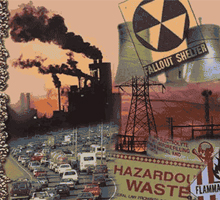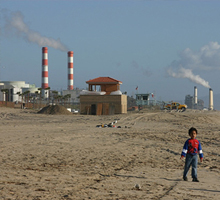Environmental discrimination
The quality of life of the population depends on the quality of the natural and social atmosphere in which they are. Societies have developed activities that are environmentally discriminatory. One of the causes of this is the lack of knowledge that the environmental degradation affects the natural resources and the human life. This relation becomes more evident when the environmental degradation causes serious problems of health and quality of life.
The first step to confront the environmental discrimination is to become aware from its existence. It is necessary to consider the way in which the commerce is developed, public works, laws, and control and evaluation of the activities that affect in an unequal form the environment of certain sectors of the population. The society must participate actively in the decision making in these areas.
The environmental discrimination is accentuated in the poorest, vulnerable and marginalised sectors of the population. Therefore, the societies must develop a special sensitivity before the environmental conditions of these groups.
The poverty goes together with the environmental discrimination, and also with other forms of racism and discrimination. The poor districts of our big cities frequently suffer the irregular presence of an excessive load of polluting industries, garbage dumps, absence of residual water purification, etc., that is added to the shortage of cultural, sanitary and of incorporation to the labour world possibilities.
This situation very directly repels in the children and adolescents who live in these areas, because they limit their development as healthful beings. Among them, there are more poisonings, infectious and sexual transmission diseases, drug addiction, psychiatric and behavioural disorders, and labour and home accidents.
Other especially vulnerable sectors are women, children, disabled people and environmental refugees (people forced to leave their homes due to the environmental degradation). Certain minority communities, such as natives and the gypsies, undergo a severe environmental discrimination, because they often depend on the natural resources for their cultural subsistence. Like other vulnerable sectors, these communities do not have means or access to the decision making destined to avoid that damage to their environment takes place.
A way to identify the environmental discrimination is making studies of environmental impact, that allow anticipating possible effects in the atmosphere of some proposed activity. It is not enough to analyse the environmental impact of a determined project, the human impact must also be considered. And we must contemplate not only the internal or immediate impact of the activity but also the way in which it affects the society, as well as the service life of the products that affect the human populations. These studies can help to reformulate projects so that they are less discriminatory or harmful for environment.
Moreover, the national and local governments must promote and promulgate laws for the protection of environment to ensure the exercise of human rights of the most vulnerable individuals.
Article 45 of the Spanish Constitution establishes the right of the citizens to environment: “All people have the right to enjoy a suitable environment for the development of the person, as well as the obligation to conserve it; the public powers will ensure the rational use of all the natural resources, with the purpose of protecting and improving the quality of life and defending and to recovering the environment, getting the indispensable support of the collective solidarity…”.
When the law is not complied with, the citizens can press the government so that they ensure its fulfilment, or they themselves can restore private actions.


